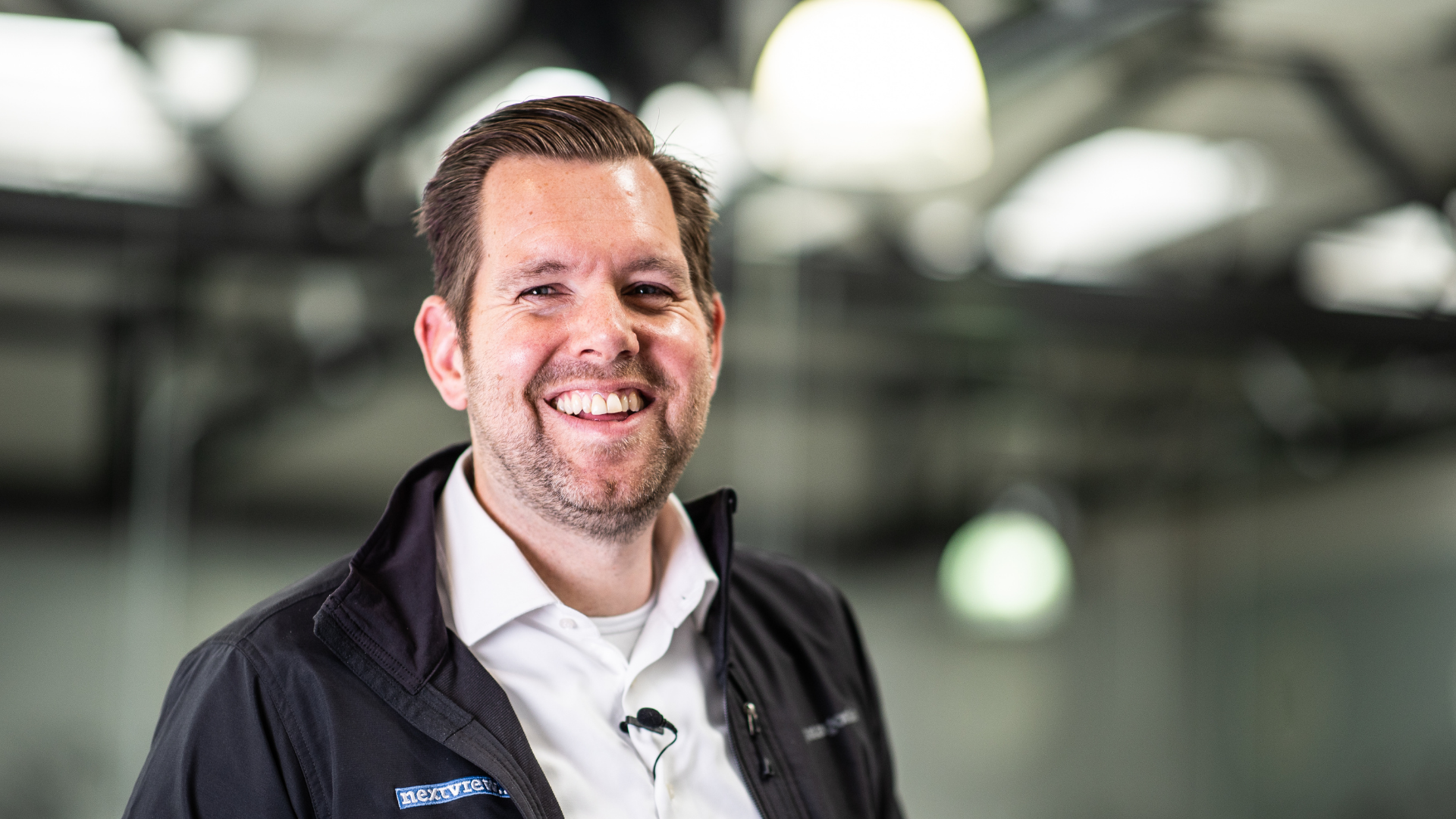


Huub Waterval is the founder and CEO of one of the top Salesforce consulting firms in Europe: Nextview Consulting. The company is specialized in finding the best solutions for their clients' businesses using Design Thinking tools. The 42-year-old lives in Maastricht, which he lovingly sees as the center of Europe: "The only problem is that a lot of other stuff is far away from it," he jokes. He describes himself as a very loyal person, happy to keep lifelong close friends who he cites as great supporters and believers in his competence.
Beyond the profitable side of the business, Huub has raised relevant discussions among his colleagues, such as environmental concerns and the establishment of a (real) gender-equal workplace. Nevertheless, Huub says he doesn't consider himself a philanthropist but sees these initiatives as part of a well-developed, Great Places to Work winning company.
Why have you decided to do more than work merely for profit?
Amid the financial crisis, we started Nextview with a bold objective: grow it to 5 million in revenue in five years. We heard we were crazy in doing so. Nevertheless, we achieved that goal, and we fulfilled the promise I had made if we did: we climbed one of the highest mountains in Austria in 2014. While the entire team celebrated, I thought: "what's next?" Only thinking about the revenue growth wasn't inspiring to me. So I started an MBA during which I learned about purpose-driven enterprises and B Corp, a sort of certification for companies that do business as a force for good: I discovered that these have a higher performance compared to others. So, I understood that this approach would help us position ourselves uniquely.
I don't consider myself a philanthropist: this is the new business model of the 21st century. You also get a better company by doing good, and that has been our basic reasoning from 2015.
Can you give us some examples of successful initiatives promoted by Nextview?
We did plastic fishing from the Amsterdam canals with Plastic Whale, became a partner and eventually one of their investors. In the end, the product or service is not the plastic fishing or the furniture we made with the material collected, but the conversation around plastic fishing. We are also one of the founders of Maas Cleanup: over the last couple of years, we've done several massive cleanup sessions with over 5000 people to clean the river Maas, in Limburg. In one day, we got over 100.000 kilos of plastic. So, being a company with a 21st-century point of view encompasses not only gender equality, but we also try to address other important topics.

Nextview is considered a top place to work, and, as a CEO, you wanted to be involved in truly making the company a great place. What are some challenging aspects of creating such an environment?
We are in a hyper-competitive market. So, to be the best in what we do, we must provide the best environment to attract highly talented people. They don't want to work for monetary income only, but emotional income as well: they need to feel at home when working, and there's a myriad of factors that can impact that feeling. I think the company's identity and culture are fundamental in that aspect: those are crucial growing agents for companies, so we've been investing a lot in our culture as this is the glue that holds everything together. Of course, the secondary benefits and the salaries are important, but that is not why people stay: people also work for people.
The selection process to work for Nextview is highly demanding, and that has a couple of advantages. First, when you succeed, it makes you really proud. Second, colleagues feel they can trust and admire each other; after all, they know how meticulous the selection process has been for everyone. So it naturally nurtures a sense of mutual credit and reliance.
You mentioned gender equality before. How can companies take concrete steps towards that?
In the beginning, our consulting base was composed basically of white males. I set myself to create a diverse gender-equal company, including the LGBTQIA+ community. If you want to start something good, you need to solve the gender equality imbalance, the top inequality globally. The tech world especially is a male-driven business. People ask me, "How do you do this?" To which I reply: "Well, it's very simple: stop hiring men." I obviously can't fire the great guys around me just because they're men. But when we have a new senior-level position, we can actively look for a female to take on the role. We were looking for the very best female Managing Director for our Germany branch, for example, and we simply didn't stop until we found the best. Also, how seriously will people take me internally if we create an all-male supervisory board?
People say they find gender equality important and gibberish around it a lot. However, they choose the "easy" way out with every decision. If we think there are more men than women in the field and, for this reason, finding qualified men is much easier, we are going for the easy solution, not the best. It can be more challenging but, in the end, this movement creates a far better culture. It's all about having a vision of the company you want to build and putting your money where your mouth is.
How can design thinking be an asset for businesses?
Design thinking comes from product design, and it's been around for a few decades now. In summary, it's about understanding how you can design a fantastic experience around your service or product. Usually, the first thing people do is run towards a solution. We receive these massive requests for proposals containing what people think is the problem, and the solution they (think they) need. We know for sure that "the problem" is not the problem, but they can't figure it out. Design thinking offers a methodology for working with your clients and finding out the real problem. That is how about 60% of our time with our clients is spent before we even start talking about technology.
Most companies are primarily interested in how they want to sell, which is irrelevant. The only relevant thing is understanding how your customers want to buy. If you get that, you can look at the touchpoints to optimize this process. It sounds so simple, but it's tough for organizations to think this way. And that is why we use design thinking to get them to do this right.
For this we have created the Nextview Design Thinking Centers. One of them is on the High Tech Campus 27, in Eindhoven: we have a very inspirational 1200 square meter large creative room that is unprecedented in its concept.

How has the pandemic affected Nextview?
We did expect the spirits to drop, like everywhere else. So, it was a fantastic surprise when we got, again, a "best workplace" recognition and that our results were comparable to the year before. Although we were already a digital company, our clients were not. So, at the beginning of the pandemic, we had to adapt from our people visiting customers to working in a digital, remote way. And we saw many great opportunities in this aspect. We used to have international workshops at our Design Thinking Center with guests coming from various countries. Now, we had the chance to promote workshops with people from all over the planet who would typically not have been invited to fly over. There was also a shift when it came to hiring, as all companies were always fighting for the same talent. Now, we can source people from everywhere, and they can live where they are happy, close to their families. Thanks to all these transformations that made us uncomfortable, our hiring strategy has also changed.
How can one be a good leader in this ever-more digital world?
I've never had my own office; I've never had a parking spot or anything of the sort. So, at Nextview, we were used to the idea that it's not a status that determines if you're a leader or not. Especially now, in the circumstances we're all living in, our leadership skills are tested all the time, which I think is excellent.
You can't do business with a fax machine anymore: you need to go digital and lead your people there. While five years ago, a new enterprise would think about the best location for their headquarters, nowadays the number one question is "in which digital platform are we establishing ourselves?", as the physical office became irrelevant. We believe that this digital headquarters model will be the new normal.
Would you share with us the best piece of advice you were ever given?
Surround yourself with and only work with the best people, meaning those you would want to work for yourself. I'm still amazed by the amount of talent we've gathered around us. The Great Places to Work survey has this question: "Why do you think Nextview is a great place to work?" And everyone says that it's about the colleagues. I truly believe that having fantastic people around you is essential.
Join the Fe+male Tech Heroes network to stay updated about our mentor sessions, conferences and dinners. Where you can also meet our role models.
